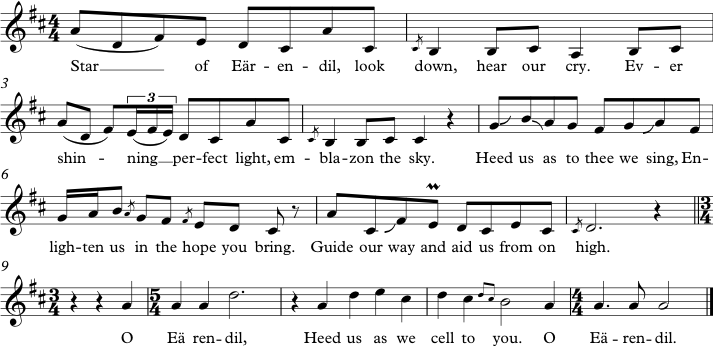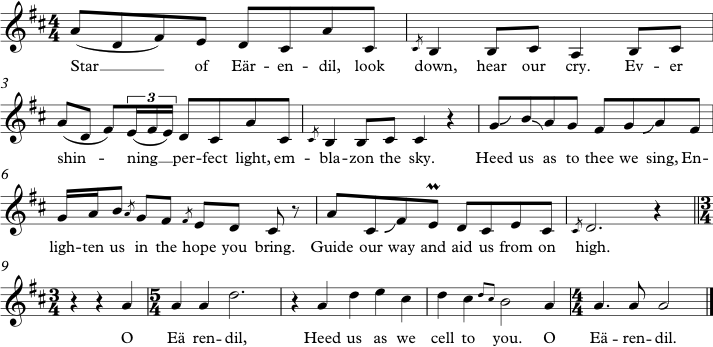Tolkien Ensemble, Song of Eärendil, TE CD 2, Track 2, 10:18.
Lord of the Rings Musical, Star of Eärendil, LotR M, Track 7, 4:11.
Lord of the Rings Musical, Star of Eärendil, LotR M, Track 7, 4:11.
Another poem of Bilbo’s making, the Song of Eärendil is about the great mariner from the First Age, father of Elrond and the first mortal to set foot in Valinor. He convinced the Valar to help against Morgoth (Melkor). While at the time of the War of the Ring, Eärendil dwelled in the West, he indirectly nevertheless played an important role in Frodo’s mission: Light from the Silmaril he brought to the West and which shone as a star in the sky was trapped in the phial Frodo was given by Galadriel. This Silmaril is what Frodo refers to with his exclamation “Star of Eärendil“ when using the phial.
In Rivendell, Bilbo with the help of Aragorn wrote a long song about Eärendil, retelling his journey to the West, and performed it in front of Elrond and his court. The rendition of this song by the Tolkien Ensemble is interesting in that, for such an epic tale, it only has Bilbo singing, accompanied by classical guitar, in a style in parts reminiscent of a parlando aria. While not maintaining a high tempo at one note per syllable over the whole piece, when compared with either Elvish songs or the Ensemble’s version of the Old Walking Song, the Song of Eärendil is one of the fastest pieces. Reiff gives the feel as “vivo”. The Ensemble probably chose this approach to counter the great length of the poem. Indeed the style fits Bilbo well; it appears as a mixture of learned art song, possibly influenced by the songs Bilbo heard from the Elves, and his own Hobbit heritage, combining the two into a kind of Hobbit art music. Elrond and his company certainly seemed to enjoy the performance, but compared to the rest of Elvish music presented by the Ensemble, it might have sounded very “Hobbit-like” to them, which is not necessarily a bad thing. Maybe Bilbo deliberately fell back on the rather quick Hobbit folk style for the first time at Rivendell in this poem – the Elves requesting an encore certainly suggests that this performance notably differed from previous performances of other songs by Bilbo at the place.
transcription (excerpt): Song of Eärendil, TE CD 2, Track 2.
http://soundcloud.com/middle-earth-music/4-1-3-song-of-e-rendil/s-ftnEm
The guitar once again is questionable as a Middle-earth instrument, but this is eased by the fact that it is plucked, not strummed, which makes it possible for the sound to represent a kind of Elvish lute or a similar instrument. The version presented here fully qualifies as a recreation of Bilbo’s original performance. Since the melody of the verses stays the same all the time, from a compositional and dramatical point of view, the Song of Eärendil would have been a good opportunity for enhancing the lyrics by means of composing an ensemble accompaniment serving to drive the narrative of the poem forward. The rather simple version by the Ensemble brings the poem to live very well, though. Considering Reiff’s vision of his pieces to work as part of a dramatic retelling of the story, such additional musical elements would have made sense, however.
It is interesting to note that while the book lays some focus on Eärendil as a person with the Song of Eärendil, the motion picture leaves him out more or less completely. Galadriel mentions “our most beloved star” when giving Frodo the phial, but nothing here suggests that Eärendil is actually a person. In fact it seems as if the star was called this way. Bilbo's song does not feature in the film at all. The stage production, on the other hand, has its own song Star of Eärendil, which is sung when the Fellowship embarks on their task:
transcription (excerpt): Star of Eärendil, LotR M, Track 7.
Eärendil is not explicitly mentioned as a person, but the title alone makes it clear that he is a person, not a star. During the show, his blessing of the Fellowship is several times mentioned again, which makes his role more important than in the book. Musically, we can again observe a stylistic mixture of immediately accessible, "Hobbit-like" melodies with a sophisticated "Elvish" feel, just as with the version of the Tolkien Ensemble. The song from the musical also employs tonal ornamentations (see bars 5 and 6 of the transcription), which in the musical is a trademark stylistic element of Elvish music.




